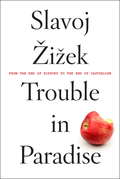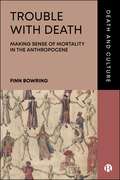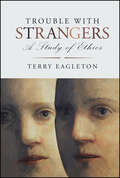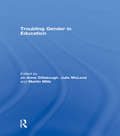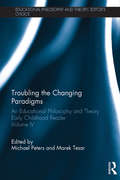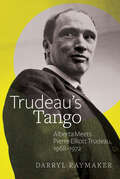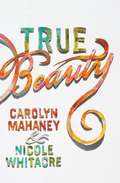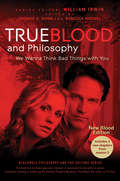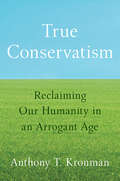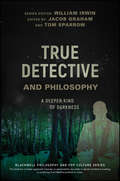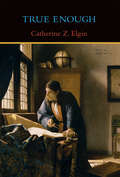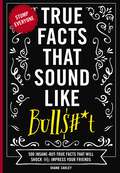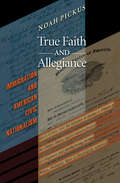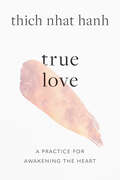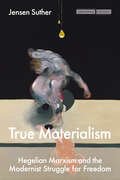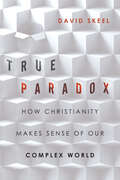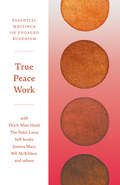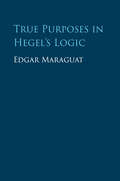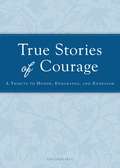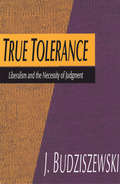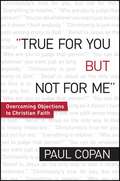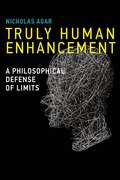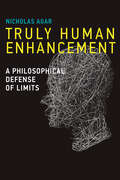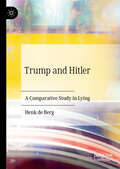- Table View
- List View
Trouble in Paradise
by Slavoj ZizekIn Trouble in Paradise, Slavoj i ek, one of our most famous, most combative philosophers, explains how we can find a way out of the crisis of capitalism. There is obviously trouble in the global capitalist paradise. But why do we find it so difficult to imagine a way out of the crisis we're in? It is as if the trouble feeds on itself: the march of capitalism has become inexorable, the only game in town. Setting out to diagnose the condition of global capitalism, the ideological constraints we are faced with in our daily lives, and the bleak future promised by this system, Slavoj i ek explores the possibilities--and the traps--of new emancipatory struggles. Drawing insights from phenomena as diverse as "Gangnam Style" to Marx, The Dark Knight to Thatcher, Trouble in Paradise is an incisive dissection of the world we inhabit, and the new order to come.From the Hardcover edition.
Trouble with Death: Making Sense of Mortality in the Anthropocene (Death and Culture)
by Finn BowringAre we accepting of death, or in denial of it? What insights can we gain from the ways death has been imagined, theorized, and organized throughout Western social and intellectual history that might help us respond meaningfully to the climate emergency? This interdisciplinary study begins with the role of tragedy in Greek antiquity and examines European attitudes toward death, especially their entanglement with colonial atrocities and politically organized killings. Drawing on the work of philosophers, sociologists, historians, and psychoanalysts, this is a resounding call to confront our responsibility for the lives of others—and the future of life itself—amid the existential threats of the Anthropocene.
Trouble with Strangers: A Study of Ethics
by Terry EagletonIn this major new book, Terry Eagleton, one of the world’s greatest cultural theorists, writes with wit, eloquence and clarity on the question of ethics. Providing rare insights into tragedy, politics, literature, morality and religion, Eagleton examines key ethical theories through the framework of Jacques Lacan’s categories of the Imaginary, the Symbolic and the Real, measuring them against the ‘richer’ ethical resources of socialism and the Judaeo-Christian tradition. a major new book from Terry Eagleton, one of the world’s greatest cultural theorists investigates ethical theories from Aristotle to Alain Badiou and Slavoj Žižek engages with the whole modern European tradition of thought about ethics brings together personal and political ethics and makes a passionate case for political love
Troubling Gender in Education
by Martin Mills Julie McLeod Jo-Anne DillaboughThis book explores new questions and lines of analysis within the field of ‘gender and education’, conveying some of the style and diversity of contemporary research directions. It celebrates as well as assesses the achievements of feminist work in education, acknowledging this legacy while also ‘troubling’ and opening up for critical reflection any potential stalemates and sticking points in research trends on gender and education. The collection has a strong cross-cultural focus, with chapters exploring experiences of students and teachers in the UK, the US, Australia, Canada, Hawaii and South Africa. The chapters examine topics relevant to both boys’ and girls’ education and to forms of education which span different sectors and both informal and formal spaces. Issues examined include citizenship and belonging, affect, authority and pedagogy, sexuality and the body, racism, and national identity and new and emerging forms of masculinity and femininity. Across these varied terrains, each of the authors engages with theoretical work informed by a broad range of disciplinary and interdisciplinary approaches from across the social sciences and humanities, drawing variously from postcolonial, queer, and new sociological theories of modernity and identity, as well as from fields such as cultural geography and narrative studies. This collection of thought-provoking essays is essential reading for scholars and graduate students wanting to understand the current state of play on research and theory on ‘gender and education’.This book was published in a special issue of Discourse: Studies in the Cultural Politics of Education.
Troubling the Changing Paradigms: An Educational Philosophy and Theory Early Childhood Reader, Volume IV (Educational Philosophy and Theory: Editor’s Choice)
by Michael A. Peters Marek TesarTroubling the Changing Paradigms is the fourth volume in the Educational Philosophy and Theory: Editor’s Choice series and represents a collection of texts that were selected as representations of the philosophy and pedagogy of early years, childhood and early childhood education. The philosophy of the early years is complex, and this book demonstrates how this fascinating subject can be interlinked with both the philosophy and history of education as being instrumental in shaping the child subject, childhoods and children’s educational futures. This book demonstrates the application of philosophical and theoretical perspectives that provide us with global and local narratives and understandings of children as subjects, and their subjectivities. The philosophical traditions offer new spaces in which to think about alternative childhoods, and contribute to an important analysis in which philosophy has the capacity to shape children’s lives and education, and to elevate the multiplicity of discourses around very young children and their education and care. Through the texts in this volume, the authors aim to find creative philosophical forms that are capable of interrupting, if not disrupting, traditional and, in some settings, perhaps more conventional discourses about children and their childhoods. These philosophical forms present productive ways that allow fresh conceptions of what is all too often an assumed set of subjectivities and experiences about very young children. Troubling the Changing Paradigms will be key reading for academics, researchers and postgraduate students in the fields of philosophy of education, philosophy, education, educational theory, post-structural theory, the policy and politics of education, and the pedagogy of education.
Trudeau's Tango: Alberta Meets Pierre Elliott Trudeau, 1968–1972
by Darryl RaymakerA chronicle of Pierre Elliot Trudeau’s first term as prime minister and the attempt to bridge one of Canada’s classic political fault lines.Trudeau appeared to enjoy the encounter. He stood his ground while escaping projectiles, including a tomato . . .In this insightful and lively history, Liberal insider Darryl Raymaker recalls the attempt to broker “a marriage from hell” between the federal Liberal Party and Alberta’s Social Credit government in the late 1960s. Raymaker uses his deep connections and backroom knowledge to trace the tangled political relationships that developed when charismatic statesman Pierre Trudeau confronted the forces of oil and agriculture in Canada’s west. Part memoir, part chronicle, Trudeau’s Tango provides a window into Canadian history, politics, economics and the zeitgeist of the late 1960s.“Trudeau’s Tango is part memoir, part documentary of the geographic, cultural and political divisions that are a permanent fixture of Confederation. The fact we held it together remains a world-class achievement. . . . Compelling reading for any Canada 150 book club . . . A fresh and lively account of politics with sharp elbows.” —Holly Doan, Blacklock’s Reporter“An excellent book about Alberta and the Trudeaus.” —Warren Kinsella, HuffPost“[Raymaker’s] book recalls a tumultuous political era with wry humour and a touch of anger.” —Frank Dabbs, Alberta Views“A detailed chronology of the history and tangled political relationships of the Liberal Party at the national and provincial levels and its opponents in Alberta—the once dominant Social Credit Party and then the Progressive Conservatives—from December 1967 through November 1972. The account is filled with blow-by-blow descriptions of political events and encounters at the provincial level. . . . Recommended.” —G.A. McBeath, CHOICEMagazine
True Beauty
by Carolyn Mahaney Nicole WhitacreWhat Is True Beauty? Whether it's age-defying makeup or the latest diet fad, our culture continually tells women that beauty consists of flawless skin and a supermodel figure. In True Beauty, Carolyn Mahaney and her daughter Nicole Whitacre direct us to the truth of God's Word, where we encounter an entirely different--and refreshingly liberating--standard of beauty. Offering a path to freedom from the false idols that society, the Devil, and our sinful hearts so often create, this encouraging book will help you to exchange the temporary glamour of pop culture for the unfading beauty of godliness.
True Blood and Philosophy: We Wanna Think Bad Things With You (The Blackwell Philosophy and Pop Culture Series #48)
by William IrwinNEW BLOOD EDITION: Contains three new chapters from Season 3. This new edition is available as an E-BOOK ONLY and contains three chapters not found in the print book! The first look at the philosophical issues behind Charlaine Harris's New York Times bestsellers The Southern Vampire Mysteries and the True Blood television series! Teeming with complex, mythical characters in the shape of vampires, telepaths, shapeshifters, and the like, True Blood, the popular HBO series adapted from Charlaine Harris's bestselling The Southern Vampire Mysteries, has a rich collection of themes to explore, from sex and romance to bigotry and violence to death and immortality. The goings-on in the mythical town of Bon Temps, Louisiana, where vampires satiate their blood lust and openly commingle with ordinary humans, present no shortages of juicy metaphysical morsels to sink your teeth into. Now True Blood and Philosophy calls on the minds of some of history's great thinkers to perform some philosophical bloodletting on such topics as Sookie and the metaphysics of mindreading; Maryann and sacrificial religion; werewolves, shapeshifters and personal identity; vampire politics, evil, desire, and much more. The first book to explore the philosophical issues and themes behind the True Blood novels and television series Adds a new dimension to your understanding of True Blood characters and themes The perfect companion to the start of the third season on HBO and the release of the second season on DVD Smart and entertaining, True Blood and Philosophy provides food -- or blood -- for thought, and a fun, new way to look at the series.
True Conservatism: Reclaiming Our Humanity in an Arrogant Age
by Anthony T. KronmanDrawing on the riches of the Western tradition, Anthony T. Kronman defends a humane conservativism for our enlightened age As the party of the left has grown more strident, its conservative critics have responded in kind. Each year conservatives do a poorer job of defending their position as a citadel of human values without lapsing into an angry assault on ideals that they and progressives share. It becomes harder to see the enduring appeal of a true conservatism that celebrates the worth of custom and inheritance; the splendor of what is excellent and rare; the expansive solidarity of our friendship with the dead; and the dignity, indeed necessity, of our longing for a connection to the eternal and divine—while affirming that these timeless human goods are compatible with the modern ideals of equality, toleration, and reasoned argument. In this bracing book, Anthony Kronman defends a conservative philosophy of life that respects our enlightened ideals but decries the damage their arrogant simplification causes in our moral, political, and spiritual lives. Drawing on the work of Aristotle, Cicero, Spinoza, Burke, Hume, Madison, Tocqueville, Lincoln, Arendt, Heidegger, and others, he argues that humanism is conservatism, today as in the past. He reminds us that our humbling parameters make possible every form of human greatness, every human glory, every human love worthy of the name.
True Detective and Philosophy: A Deeper Kind of Darkness (The Blackwell Philosophy and Pop Culture Series)
by William IrwinInvestigating the trail of philosophical leads in HBO’s chilling True Detective series, an elite team of philosophers examine far-reaching riddles including human pessimism, Rust’s anti-natalism, the problem of evil, and the ‘flat circle’. The first book dedicated to exploring the far-reaching philosophical questions behind the darkly complex and Emmy-nominated HBO True Detective series Explores in a fun but insightful way the rich philosophical and existential experiences that arise from this gripping show Gives new perspectives on the characters in the series, its storylines, and its themes by investigating core questions such as: Why Life Rather Than Death? Cosmic Horror and Hopeful Pessimism, the Illusion of Self, Noir, Tragedy, Philosopher-Detectives, and much, much more Draws together an elite team of philosophers to shine new light on why this genre-expanding show has inspired such a fervently questioning fan-base
True Enough
by Catherine Z. ElginThe development of an epistemology that explains how science and art embody and convey understanding. Philosophy valorizes truth, holding that there can never be epistemically good reasons to accept a known falsehood, or to accept modes of justification that are not truth conducive. How can this stance account for the epistemic standing of science, which unabashedly relies on models, idealizations, and thought experiments that are known not to be true? In True Enough, Catherine Elgin argues that we should not assume that the inaccuracy of models and idealizations constitutes an inadequacy. To the contrary, their divergence from truth or representational accuracy fosters their epistemic functioning. When effective, models and idealizations are, Elgin contends, felicitous falsehoods that exemplify features of the phenomena they bear on. Because works of art deploy the same sorts of felicitous falsehoods, she argues, they also advance understanding. Elgin develops a holistic epistemology that focuses on the understanding of broad ranges of phenomena rather than knowledge of individual facts. Epistemic acceptability, she maintains, is a matter not of truth-conduciveness, but of what would be reflectively endorsed by the members of an idealized epistemic community—a quasi-Kantian realm of epistemic ends.
True Facts That Sound Like Bull$#*t: 500 Insane-But-True Facts That Will Shock and Impress Your Friends (Mind-Blowing True Facts)
by Shane CarleyProve you are the smartest schmuck in the room with 500 true trivia facts that sound absurd. These facts are so absurd some might even say that they sound like bull$#*t!Knowledge is power! Crush the competition at trivia night, or start the most interesting conversation ever with real facts that are hard to believe. This book is loaded with mind-blowing facts that are sure to keep you wondering, "How are these even true?" while equipping you to outsmart everyone around and blow their minds. Topics include:ScienceAmerican SportsHistoryPop CultureNaturePut your game face on, and prove once and for all that you are the real know-it-all! Gather your friends and family 'round and get ready to learn some wild and crazy trivia and facts such as:True or False? A chicken once survived almost two years after having its head cut off.True or False? The dog that played Toto in The Wizard of Oz was paid a salary.How many baseballs does the MLB use every season?What state has jousting as its official sport?True or False? Most Canadians live south of Seattle.Stump everyone with True Facts That Sound Like Bull$#*t!
True Faith and Allegiance: Immigration and American Civic Nationalism
by Noah PickusTrue Faith and Allegiance is a provocative account of nationalism and the politics of turning immigrants into citizens and Americans. Noah Pickus offers an alternative to the wild swings between emotionally fraught positions on immigration and citizenship of the past two decades. Drawing on political theory, history, and law, he argues for a renewed civic nationalism that melds principles and peoplehood. This tradition of civic nationalism held sway at America's founding and in the Progressive Era. Pickus explores how, from James Madison to Teddy Roosevelt, its proponents sought to combine reason and reverence and to balance inclusion and exclusion. He takes us through controversies over citizenship for blacks and the rights of aliens at the nation's founding, examines the interplay of ideas and institutions in the Americanization movement in the 1910s and 1920s, and charts how both left and right promoted a policy of neglect toward immigrants and toward citizenship in the second half of the twentieth century. True Faith and Allegiance shows that contemporary debates over a range of immigration and citizenship policies cannot be resolved by appeals to fixed notions of creed or culture, but require a supple civic nationalism that bridges the gap between immigrants' needs and American principles and practices. It is critical reading for scholars, policy makers, and all who care about immigrants and about America.
True Love: A Practice for Awakening the Heart
by Thich Nhat HanhIn this little treasure, Thich Nhat Hanh offers a Buddhist view of love along with techniques for manifesting it in our daily lives. In his characteristically direct, simple, and compassionate style, he explores the four key aspects of love as described in the Buddhist tradition: lovingkindness, compassion, joy, and freedom. In order to love in a real way, Thich Nhat Hanh explains, we need to learn how to be fully present in our lives. In True Love he offers readers the technique of conscious breathing as a method for synchronizing the mind and body to establish the conditions of love. He goes on to offer a mantra practice for generating love that consists of expressing four key statements or intentions in our relationships. These include: "Dear one, I am really there for you"; "Dear one, I know that you are there, and I am really happy about it"; "Dear one, I know that you are suffering, and that is why I am here for you"; and "Dear one, I am suffering, please help me." In the concluding section of the book, Thich Nhat Hanh explains how love can help us to heal our own pain, fear, and negativity. He explains that we must not regard negative emotions as bad and repress them. We must recognize them as part of us and allow them into our consciousness, where they can be cared for by the "loving mother of mindfulness."
True Materialism: Hegelian Marxism and the Modernist Struggle for Freedom (Cultural Memory in the Present)
by Jensen SutherIn recent years, there has been an explosion of interest in both Marxism and German Idealism across the humanities, but the discourse around the two traditions has grown stagnant and is still defined by the same century-old debates—materialism versus idealism, history versus logic, revolution versus reform. With this exciting new work, Jensen Suther endeavors to transform this discourse by presenting an unprecedented systematic vision of the possibility of a Hegelian Marxism, grounded in Aristotle's logic of living form. Through engagement with three titans of literary modernism—Franz Kafka, Thomas Mann, and Samuel Beckett—Suther pursues not only an account of Hegel's materialism but also a new critique of capitalist modernity. Breaking with the received view of Marx's relation to German Idealism, the book argues that the materialist critique of capitalist production is inseparable from Hegel's idea that the demand for freedom is a demand for mutual recognition. The implication for Marxist criticism is that literary works cannot be understood apart from the political struggle for both recognition and new forms of social production. Anyone invested in socialist politics, the future of literary theory, the history of philosophy, and the study of modernism will want to contend with the way Suther rethinks Marxist theory and literary criticism from the ground up, starting with their foundations in Hegelian thought.
True Paradox: How Christianity Makes Sense of Our Complex World (Veritas Books)
by David SkeelForeword Review's
True Peace Work: Essential Writings on Engaged Buddhism
by Parallax PressThich Nhat Hanh, His Holiness The Dalai Lama, bell hooks, Bill McKibben, Gary Snyder, Maha Ghosananda, Charles Johnson, Bhikkhu Bodhi, Matthieu Ricard, and many others are featured alongside each other in this foundational trove of Buddhist essays, poems, and teachings.Now a modern classic, True Peace Work is the premier collection of writings on the practice of Engaged Buddhism, a term that Zen Master Thich Nhat Hanh coined in the 1960s as part of his peace work in Vietnam that has grown to become a worldwide movement. The topics covered here are especially relevant in today's world: from creating nonviolent social change, to raising climate awareness, to simply learning how to walk (and enjoy it). This is not purely an activist's manual, however. True Peace Work is a spiritual bedrock that is as timeless as it is timely, one that insists on the connection between peace in oneself and peace in the world.Originally published in 1996 as Engaged Buddhist Reader, this revised edition has been expanded for our current time with a new introduction and additional contributors.
True Purposes in Hegel's Logic
by Edgar MaraguatThis book addresses a key issue in Hegel's philosophical legacy - his account of purposiveness and teleology - that has often been wrongly criticised and misunderstood. In a re-examination of Hegel's account of purposiveness and teleology, Edgar Maraguat explores its connection with the rest of Hegel's philosophy, traces the influence of Aristotle and Kant on its arguments, and closely analyses its place in Hegel's Science of Logic. The result is a new perspective not only on the nature, spirit and goals of the Logic, but on the whole of Hegel's philosophical legacy, and will appeal to a range of readers in Hegel studies, the history of philosophy, and the history of ideas.
True Stories of Courage: A tribute in honor, endurance, and endeavor (Cup of Comfort Stories)
by Colleen SellIn True Stories of Courage, you’ll find the heroines and heroes who have transformed the lives of everyone who knows them. These three stories will kindle your spirit and offer you hope whenever you need it. It’s nothing less than a supporting friend a powerful mentor in times of struggle—and triumph.
True Tolerance: Liberalism and the Necessity of Judgment
by Jay BudziszewskiIn contemporary liberal thought, "tolerance" has come to be redefined as a synonym for ethical neutrality: refusal to judge among competing views of goods and evils. The result of this extreme relativism has been a foundations crisis in law, politics, education, and other areas of social life. In this lucidly written and brilliantly argued volume, J. Budziszewski attempts to reserve the self-destruction of modern liberalism by showing that true tolerance is not only consistent with taking stands about objective goods and evils, but actually requires doing so.Tolerance, falsely understood as ethical neutrality, has the paradoxical effect of crippling policy choice by divesting it of the moral and practical framework on which it depends. By painstakingly and exhaustively dissecting each of the many neutralist arguments, Budziszewski demonstrates that real neutrality is logically impossible. Confronted by alternative views, the neutralist at best obscures his own underlying judgments, and at worst abandons all possible defense against fanatics who oppose both true equality and true tolerance.True Tolerance is both a rigorous critique, and a polemic undertaken in the name of a positive, twenty-first century vision of liberalism. Budziszewsky outlines a view of true tolerance that assumes a relationship with an older liberal tradition and a codependence with other virtues, including humility, mercy, charity, respect, and courtesy. This vision is rooted in historical experience and rational conviction about what is good. In the spirit of liberal and classical theorists of virtue from Aristotle to John Locke to Alasdair MacIntyre, the virtue of true tolerance is much more than a readiness to follow known rules; it includes a developed ability to distinguish good rules from bad, and to choose rightly even where there are no rules or where rules seem to contradict each other. Accessibly written and intended for a wide readership, True Tolerance will be of special interest to political theorists and activists, and to sociologists and philosophers.
True for You, But Not for Me: Overcoming Objections to Christian Faith
by Paul CopanApologetics authority Paul Copan tackles popular sayings that often leave Christians speechless, such as "All religions lead to God," "Who are you to judge others?" or "Jesus was just another great religious leader." He provides readers with thoughtful explanations of anti-Christian slogans and brief answers to help them continue their conversations with non-Christians. In addition, Copan answers questions about the unevangelized. Study questions for group or individual use are included.
Truly Human Enhancement
by Nicholas AgarThe transformative potential of genetic and cybernetic technologies to enhance human capabilities is most often either rejected on moral and prudential grounds or hailed as the future salvation of humanity. In this book, Nicholas Agar offers a more nuanced view, making a case for moderate human enhancement -- improvements to attributes and abilities that do not significantly exceed what is currently possible for human beings. He argues against radical human enhancement, or improvements that greatly exceeds current human capabilities. Agar explores notions of transformative change and motives for human enhancement; distinguishes between the instrumental and intrinsic value of enhancements; argues that too much enhancement undermines human identity; considers the possibility of cognitively enhanced scientists; and argues against radical life extension. Making the case for moderate enhancement, Agar argues that many objections to enhancement are better understood as directed at the degree of enhancement rather than enhancement itself. Moderate human enhancement meets the requirement of truly human enhancement. By radically enhancing human cognitive capabilities, by contrast, we may inadvertently create beings ("post-persons") with moral status higher than that of persons. If we create beings more entitled to benefits and protections against harms than persons, Agar writes, this will be bad news for the unenhanced. Moderate human enhancement offers a more appealing vision of the future and of our relationship to technology.
Truly Human Enhancement: A Philosophical Defense of Limits (Basic Bioethics)
by Nicholas AgarA nuanced discussion of human enhancement that argues for enhancement that does not significantly exceed what is currently possible for human beings.The transformative potential of genetic and cybernetic technologies to enhance human capabilities is most often either rejected on moral and prudential grounds or hailed as the future salvation of humanity. In this book, Nicholas Agar offers a more nuanced view, making a case for moderate human enhancement—improvements to attributes and abilities that do not significantly exceed what is currently possible for human beings. He argues against radical human enhancement, or improvements that greatly exceed current human capabilities.Agar explores notions of transformative change and motives for human enhancement; distinguishes between the instrumental and intrinsic value of enhancements; argues that too much enhancement undermines human identity; considers the possibility of cognitively enhanced scientists; and argues against radical life extension. Making the case for moderate enhancement, Agar argues that many objections to enhancement are better understood as directed at the degree of enhancement rather than enhancement itself. Moderate human enhancement meets the requirement of truly human enhancement. By radically enhancing human cognitive capabilities, by contrast, we may inadvertently create beings (“post-persons”) with moral status higher than that of persons. If we create beings more entitled to benefits and protections against harms than persons, Agar writes, this will be bad news for the unenhanced. Moderate human enhancement offers a more appealing vision of the future and of our relationship to technology.
Trump and Hitler: A Comparative Study in Lying
by Henk de BergThis book compares Trump and Hitler as political performance artists. It explores their populist self-staging and rhetorical strategies and explains how they connected with their respective audiences. It also analyses the two men’s character, work ethic, and management style. In addition, the book addresses seemingly peripheral issues like the reasons behind Hitler’s toothbrush moustache and Trump’s hairstyle. By demystifying Hitler and Trump, the author throws new light on both of them.
